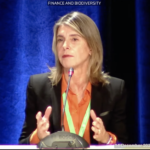
COP 15 – an historical agreement to be strenghtened by biodiversity inclusive finance
The 15th Conference of the Parties to the Convention on Biological Diversity (COP 15) was held in Montreal between December 7-19th, 2022. The previous agreement signed in Aichi Prefecture in 2010 is ending. Moreover, the pandemic delayed the international agenda of this COP. Thus, Kunming-Montreal COP was waited as a major event for the decade.
Global biodiversity framework – Strong targets for finance
This COP gathered 196 countries (the Parties) to discuss and negotiate the Kunming-Montreal Global Biodiversity Framework. Two weeks of negotiation on the 22 proposed targets and the governance rules to collaborate on biodiversity preservation for the next ten years led to a historical agreement (see the press release).
This agreement finally includes 23 key targets on the roadmap for “living in harmony with nature” by 2050. One of the significant outcomes is the protection of 30% of Earth’s lands, oceans, coastal areas, and inland waters by 2030. It also sets the goal of reducing by USD 500 billion annual harmful government subsidies and cutting down food waste in half.
Among goals and targets, the Kunming-Montreal Global biodiversity framework comprises vital outcomes for the finance sector.
Goal D calls for an alignment of all financial flows, be they public or private.
Target 15 calls for assessment and disclosure of nature on most economic and financial activities.
Target 19 encourages getting rid of harmful flows and supports private finance by promoting blended finance.
In the JuST Institute we also particularly welcome the Target 10 « Ensure that areas under agriculture, aquaculture, fisheries and forestry are managed sustainably, in particular through the sustainable use of biodiversity, including through a substantial increase of the application of biodiversity friendly practices… »

The COPs also offered a wide range of summits, pavilions and forums, and side events where participants could share their knowledge and viewpoints. Collaborations were explored to build capacity for addressing biodiversity crises. Every actor brought their vision of how to halt biodiversity loss. We report here below the highlights of some events at COP15 particularly relevant for the scope of the JuST Institute.

The Task Force on Nature-Related Disclosure (TNFD) presented and discussed the last version of its beta framework (v3.0), which had been released before the event. See all the events hosted by the TNDF.
The Finance and Biodiversity day – 14th December – has been dedicated to exploring linkages between the Global Biodiversity Framework and the financial system.
JuST Institute’s mission and contribution to inclusive biodiversity conservation was underlined by Laurence PESSEZ (BNP Paribas Head of CSR) in the closing plenary of the finance day, on “Transforming finance – Building a plan of action to align the financial sector with the shared vision of the post-2020 GBF”. Laurence PESSEZ highlights the JuST Institute’s role towards smallholder farmers in the nexus of Biodiversity, Climate and Inclusivity : « …the BNP Paribas has just launched with the Global Environment Facility the JuST Institute to tackle the nexus between social inclusion, climate and biodiversity starting from the very bottom of the supply chain: smallholders farmers who are suffering decrease of yields because biodiversity loss and because of climate change…« . The JuST Institute will train financial institutions lending to smallholder farmers on how to support their smallholder clients to manage biodiversity risks and implement Nature based Solutions (NbS). Together with IFAD, the JuST Institute will pilot a certification scheme with microfinance institutions to understand which share of the finance actually goes to NbS with the aim to enable investors to finance biodiversity conservation practices for smallholder farmers.
A plenary on “Building ambition for the financing of biodiversity: from mobilising resources to aligning all financial flows” gathered significant actors such as the Global Environmental Facility, Domini Impact Investment and a representative of the British government. Carlos Manuel RODRIGUEZ (CEO of the GEF) underlines that “ambitions should be pushed on evidence and science”. There is a real challenge to strengthen the political will to be guided by science, to protect natural capital.
Measuring and disclosing are vital to ensuring alignment with any framework. Assessment and disclosure can already drive systemic change across the financial system. These key topics were discussed in a dedicated breakout session gathering the TNFD, the Science Based Targets Network, the French Development Agency (AFD), HSBC and Nature Alpha. They discussed “Approaches for tracking, measurement, target setting and disclosures, Finance and Biodiversity Day”.
The GEF hosted many events on its pavilion. One of the panels offers an overview of the GEF and the GCF’s joint vision and collaboration in financing climate and biodiversity.
Finance for biodiversity foundation co-organised side events and sessions gathering many financial institutions.
As underlines UN chief Antonio Guterres, further destruction of biodiversity could increase the risks of emerging new pandemics and limit access to medicines and food supplies. For the JuST Institute, Climate, Biodiversity and Social inclusion are three dimensions that cannot be separated. For instance, deploying nature-based solutions with smallholder farmers well identified and catalysed by inclusive finance is key to preserving biodiversity and adapting to climate change in the most inclusive way.
See our article on the UN Climate Change Conference of the Parties held in Egypt (COP 27).